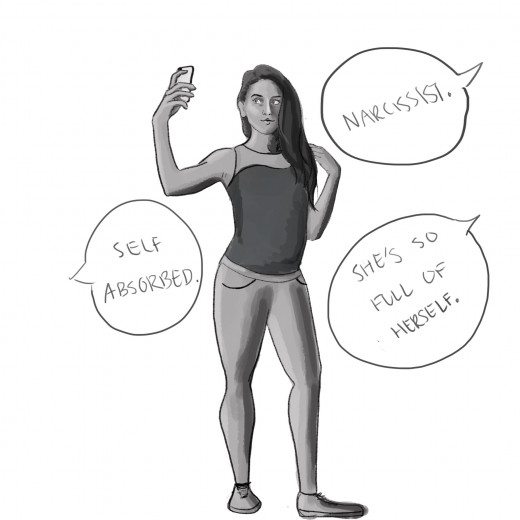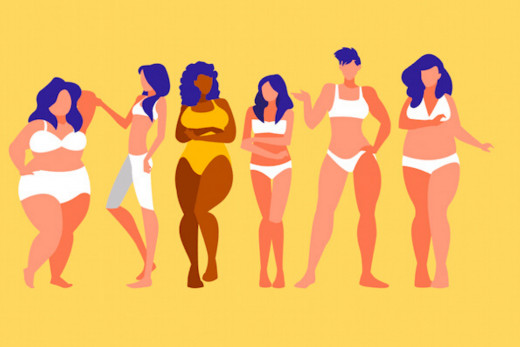The History and Downfall of Beauty Standards

The Spectrum of Narcissism
The word narcissist actually comes from the Greek myth of Narcissus, where a proud egomaniac of a man passed a river one day and saw his reflection in the still water. So stunned with what he saw, he leaned up against the pool and immediately fell in love with himself. And when he realized that his love wouldn’t be reciprocated, he was so heartbroken that his heart caught on fire in his chest until he burned to death.
So, obviously someone had a flair for the dramatic. But like their predecessor, narcissists are generally characterized to be self-centered and preoccupied with fantasies about themselves.
We’ve known about narcissists since the Greeks, and many of us were taught not to be so self-centered from a young age--or at least I hope so. However, there is another form of self-obsession that, until recently, hasn’t been actively seen as a problem.]]
Today, we are talking about our lack of body positivity. “58 percent of women” (Psychology Today) and “21 percent of heterosexual men …[are reported to be] dissatisfied” (Men’s Journal) with how they looked. And among girls aged ten to seventeen, some estimate that nearly eighty percent of them are unhappy with their bodies. If these statistics seem a little high to you, that’s because they are. Just for scale, Cars 2 was a movie so bad that it got the review, “Sweet turbo mother of fuel injections, what is this?” from a writer from the Guardian, and that movie has a higher acceptance rate with 39 percent on Rotten Tomatoes than the amount of teenage girls who accept their own bodies.
How unbelievably depressing is that? That a flashy cash-grab of a movie has more support than the amount of people who accept their own bodies.
And if we genuinely care more about the well-being of others’ physical and mental health over Lightning McQueen, then we must first understand the history of our beauty standards and why they exist, second why these expectations are so detrimental, before finally being able to take the first steps towards stopping this unhealthy obsession, allowing people to be happier about themselves and their bodies.

Why Do Beauty Standards Exist?
Since the beginning of history, people have always been consumed by their outward appearances. I mean, as far as we know, the first cave woman asked the first cavemen, “does this loincloth make my butt look big?” But why? Why do beauty standards exist? It’s a weird question, but the answer might be more complicated than what you think.
There is, of course, the Darwinistic theory of evolution. This is the idea that our idea of attraction is attached to how fertile a person looks. In our minds, a person’s physical beauty directly correlates to how easily they will carry on the human race. So for women, this includes wide hips, nice breasts, and glowing skin; for men, this means a strong figure, broad shoulders, etcetera (hand gesture).
But surprise surprise, beauty standards also have a lot to do with the cultural backdrop. During the Italian Renaissance, for example, the ideal rounder body for women signified a woman’s wealth--probably because of all that fancy pasta; and with the rise of the Progressive Movement in the 1910s that empowered women, we can see the rise of advertisements for corsets as a way to make her seem more talented and desirable. Not so progressive, is it? And today, [according to], modern day women have begun preferring “something skinnier” as their ideal, most likely as a result of the media's portrayal of runway fashion models.
But perhaps the most widely accepted reason for the persistence of beauty standards is their development within a child’s developing mind. When we are children, what we are exposed to sets the basis for our expectations of the world in the future. From Barbie to Disney Princesses to superheroes and He-Man action figures, an overexposure to exaggerated body types from our favorite fictional childhood characters changes our perception of what is normal, no matter how unnatural it really is. Like, have you seen Jasmine’s waist? Scientists have proven that her eyes are the same size as her waist, something that is obviously not natural, and yet children and adults alike idolize that as their ideal body type.
Especially with the rise of social media, these images of society’s ideal body type are so readily available to us that children, adolescence, and adults on Instagram, Facebook, and now Tik Tok are beginning to ask themselves why they can’t have such a slim waist or such broad shoulders or such a symmetrical face shape, too.
Whether it is biological, cultural, developmental, or all three, one thing is for certain: beauty standards aren’t a new concept, they aren’t going away, and they affect all of us in a multitude of negative ways.
What Have These Standards Done to Society?
Body dissatisfaction isn’t new. We know this because there have been millions of diets throughout history in order to achieve a desired body composition. Greek physicists Hippocrates believed that in order to combat the “impurity of obesity”, people must follow a rigorous schedule of purging their meals. There was William the Conqueror, who created the first recorded liquid diet in order to shed his pounds. (And fun fact, the majority of his liquid was alcohol, and he ended up dying after drunkenly falling off his horse). Now, with the growing weight-loss industry in our modern day, having a net worth of nearly 72 billion dollars in the United States, and with nearly 45 million Americans going on a diet each year, this obsession with losing weight has only risen. Gluten-free, Keto, Paleo, fruitarians, even the Cabbage Soup diet all have emerged in the public eye as the “new” way to lose weight, and so far, people’s dissatisfaction with themselves has led them head-first into one, if not all, of these fads. And you know the situation is serious when people are opting to only eat cabbage soup for the sake of waist size.
Of course this is not to say that it is bad to want to live a healthier lifestyle. But the misinformation of diet culture is actually leading to the other extreme, as people continue to eat less and less or resort to excess exercise as a result of “wanting to be healthier”. Life Science explored a study showing just how effective diets really are. The results may surprise you. Just 20% of people who went on a diet actually achieved their goals of losing weight, and out of that twenty percent, ninety-one percent had previously been on a failed diet (Live Science). Diet culture is so ineffective that even those who were a “success story” had failed multiple times before they were even able to achieve their goal.
But what about the other eighty percent? Well, since the 90s, nutritionists and life scientists have coined the term “yo-yo dieting”, where a person initially loses weight on an extreme diet but then immediately gains the weight back as soon as they stop shoveling cabbage down their throats, which causes extreme weight fluctuations over time (hence the term yo-yo). This type of dieting is extremely dangerous, because it begins to create unhealthy eating patterns of over restricting and overeating, actually leading to more weight gain and long-term health issues like heart disease and diabetes. And in recent years, more and more studies have found that extreme dieting can actually be a leading risk factor for the development of an eating disorder. Orthorexia, for example, is characterized by an obsession for “eating clean”, leading to avoidances of “bad” food. Though this might seem just like another form of dieting on the outside, this disorder actually causes the same health issues of other, more well-known disorders such as anorexia and bulimia, including muddled cognition, a lowered immune system, and in some cases, death.
How ironic is that? That an institution preaching health is the reason why people become so unhealthy in the first place.

How Can We Fix This?
So how do we fix this?
The short answer: to make people feel better in their bodies. But obviously it’s harder than it sounds.
I know I’ve been slamming social media, but turns out that it actually has a lot of potential for good. Medium suggests that this promotion of body positivity online is so important because, especially for teenagers, highlighting the vast shapes and sizes that bodies can come in is taking the right first step towards their own body acceptance. From Serena Williams to Lizzo to Demi Levato to Jonathan Van Ness to all the other influencers who have shown the world the beautiful complexities of the human body, they have opened the eyes of many of their followers, showing them that it’s okay to embrace yourself for who you are. They are a great first step, but we need more representation from both women and men to show the vast array of beautiful body types throughout the world.
Even if you aren’t on social media, everyone can join the fight for body positivity. Including you. And it all starts with a compliment. According to numerous sources, giving genuine compliments not only increases your own positivity, but it helps to spread that energy on to everyone else around you. After all, we all biologically seek others’ validation, and anyone who's ever received a good ballot from their judge knows that receiving that praise from someone other than yourself feels so, so good. We are in this fight for personal growth together, so we might as well lift each other up while we’re doing it. So yes girl, your booty is looking fly in that loincloth.








